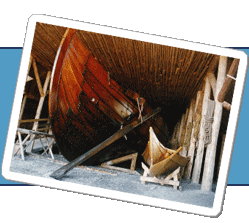On July 16, 1997, twelve men set out in an authentic replica of a Viking ship called a knarr. The purpose was to recreate Leif Ericsson's 1500 mile journey from Greenland to Newfoundland. The journey lasted from July to September and the crew attempted to be as historically accurate as possible. Leif's journey was a remarkable feat even for today since he only had the basic medieval navigational tools: the sun and the stars. L'Anse aux Meadows, Newfoundland, the site of the only confirmed Viking settlement in North America, their ship was the first authentic Viking ship to have completed the trip in 600 years.
 The
ship was christened "Snorri" after the name the Vikings gave the
first child born in the New World. It is equipped with only a square
canvas and oars. The crew faced the same hazards that Leif and his
crew faced during the original journey, near-freezing water
temperatures, potentially hostile wildlife and possibly a hurricane or
two. In case of an emergency, the modern day knarr was equipped with a
life raft and modern navigational instruments. Since they were trying to
replicate the Viking experience completely, these modern day tools was used if the crew became endangered.
The
ship was christened "Snorri" after the name the Vikings gave the
first child born in the New World. It is equipped with only a square
canvas and oars. The crew faced the same hazards that Leif and his
crew faced during the original journey, near-freezing water
temperatures, potentially hostile wildlife and possibly a hurricane or
two. In case of an emergency, the modern day knarr was equipped with a
life raft and modern navigational instruments. Since they were trying to
replicate the Viking experience completely, these modern day tools was used if the crew became endangered.
 W. Hodding Carter, the leader of "Viking Voyage 1000",
has always been fascinated with Vikings and Viking lore. Carter was
inspired by a fifth grade text, The Vikings, written by Elizabeth
Janeway. The book portrayed an account of Leif Ericsson's adventures.
He explains, "It's important to me to demystify such historic
milestones and show people the underbelly of adventuring, what it
really took for the Vikings to get to North America - the misery and
the setbacks and the hardships and the real joy of small
accomplishments, like navigating a difficult harbor in fog or finally
getting a knot tied correctly - that a series of small events can tie
together to make something big happen."
W. Hodding Carter, the leader of "Viking Voyage 1000",
has always been fascinated with Vikings and Viking lore. Carter was
inspired by a fifth grade text, The Vikings, written by Elizabeth
Janeway. The book portrayed an account of Leif Ericsson's adventures.
He explains, "It's important to me to demystify such historic
milestones and show people the underbelly of adventuring, what it
really took for the Vikings to get to North America - the misery and
the setbacks and the hardships and the real joy of small
accomplishments, like navigating a difficult harbor in fog or finally
getting a knot tied correctly - that a series of small events can tie
together to make something big happen."
Carter created the "New Vinland Foundation," a
nonprofit agency devoted to educating individuals about Viking lore and
achievements in North America, Greenland and Iceland. Leif Ericsson's
settlement was named Vinland because of all of the wild grapes that
grew so abundantly. Even 300 years after Leif's voyage, the Vikings
would return to the Vinland to harvest timber. A permanent settlement
was never established because of the ongoing battles with native
Americans. The "New Vinland Foundation" sole sponsor is "Lands' End".
The Knarr
 The
ship, or knarr, was constructed by master boat builder Robert Stevens.
The Snorri is an open-deck boat 54 feet long, 16 feet wide and 6 feet
deep. It is constructed of oak, pine, tamarack and locust woods, and
iron rivets. As we previously mentioned, the knarr was equipped with
only a square canvas sail and was propelled by wind or oars. Since
the Snorri is an open-deck ship there was nothing to protect the crew
from the inclement weather. With water temperatures around 40°F and air
temperatures hovered around 50°F, this will be a chilly journey for
the 12 brave crew members. Meals on the Snorri included high-energy
foods such as: dried fruits, meats, and grains as well as fresh fish
when the crew was lucky enough to catch something. They also tried out some authentic Viking cuisine, lichen and moss, that they
will gather on beaches during their journey.
The
ship, or knarr, was constructed by master boat builder Robert Stevens.
The Snorri is an open-deck boat 54 feet long, 16 feet wide and 6 feet
deep. It is constructed of oak, pine, tamarack and locust woods, and
iron rivets. As we previously mentioned, the knarr was equipped with
only a square canvas sail and was propelled by wind or oars. Since
the Snorri is an open-deck ship there was nothing to protect the crew
from the inclement weather. With water temperatures around 40°F and air
temperatures hovered around 50°F, this will be a chilly journey for
the 12 brave crew members. Meals on the Snorri included high-energy
foods such as: dried fruits, meats, and grains as well as fresh fish
when the crew was lucky enough to catch something. They also tried out some authentic Viking cuisine, lichen and moss, that they
will gather on beaches during their journey.
The first year they had to turn back because the rudder broke, however they arrived in L'Anse aux Meadows the next year on September 22nd,1998 after their second attempt.



